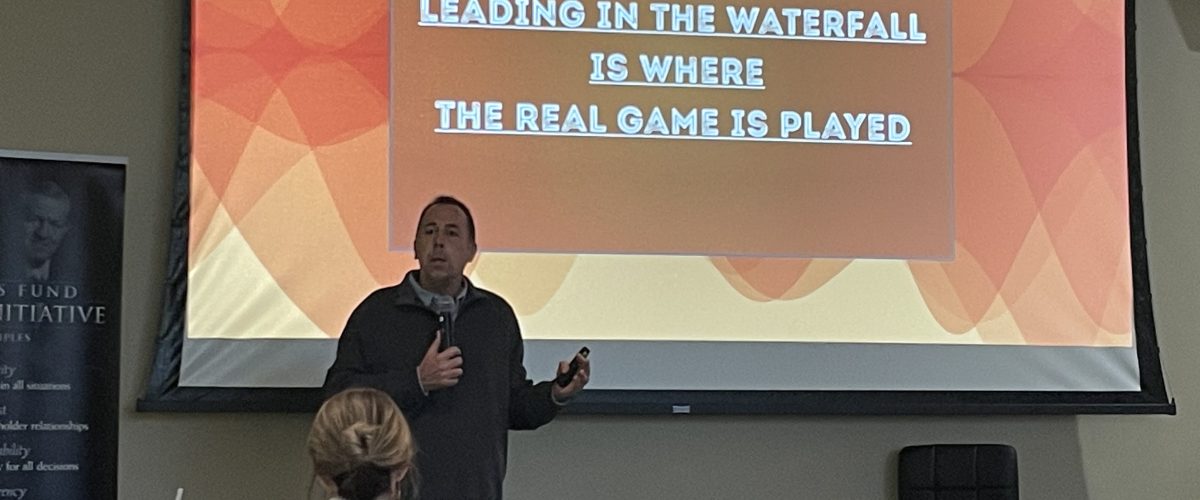
“10% of people are ‘natural-born’ leaders,”[Gallup 2022]. But does birth define one’s ability to lead? Not according to Correy Ciocchetti, the Bill Daniels Professor of Business Ethics and Legal Studies at the University of Denver, who believes that no one is born a leader. Cioccehetti believes that, just as people learn to lie and cheat, good leadership is a learned skill, though alternatively rooted in ethics.
Ciocchetti recently discussed leadership in a keynote presentation facilitated by the Daniels Fund Ethics Initiative Collegiate Program. Bill Daniels, the program’s namesake, and a cable television pioneer, mirrored the guiding principle of integrating ethics into business decisions. Principles of integrity, trust, accountability, transparency, fairness, respect, rule of law, and viability form the foundation of the initiatives, which use these principles to instill a high standard of ethics into today’s students.
This high moral standard is what effectively shapes good leaders. In his presentation, Ciocchetti challenges the common misconception. He proposes that no one can lead in a society that strives to turn everyone into a leader. “But if we strive to turn everyone into leaders, how come I’ve never had a good boss?” asked Ciocchetti. He posits that most leadership training skips one crucial step, character, and skipping this step will always lead to failure. If trainers do not charge the importance of ethics, then the virtues, such as emotional awareness or humility, taught by leadership programs weaken.
With great responsibility and long to-do lists, leaders can often miss obvious and critical steps to success. Ciocchetti offers an example of consistent internal reflection on one’s own morality. He explains that most people prefer to shift the blame outward instead of reflecting on their leadership effectiveness. He also suggests avoiding playing favorites and checking in with all team members. “Do you genuinely care?’ Ciocchetti asked. It’s an oft-missing leadership component, “If you don’t care about what you do every day of your life professionally, you’ll never be able to lead people you don’t like.”
“If you don’t care about what you do every day of your life professionally, you’ll never be able to lead people you don’t like.”
-Correy Ciocchetti
Despite his general dislike of acronyms, Ciocchetti presented the acronym GOOD, which can help mitigate weaknesses in leadership. G stands for the “golden mean,” based on Aristotle’s idea that humans are made to flourish, and to flourish, one must be virtuous. Seeking the “golden mean” means working to decrease vices and finding ways to work to practice virtues such as honesty, compassion, and courage. The first O stands for “caring for others,” referring to how caring is critical to good leadership. “Own it” fashions the second O and describes how leaders must fully own up to their mistakes and avoid shifting or circumventing blame. The D stands for “pinpointing duties” and emphasizes how leaders shouldn’t make exceptions for themselves that they wouldn’t grant to other people.
Ciocchetti asserted no one is born a leader, but through personal work and reflection, anyone can be. He stressed that the most critical step is considering one’s “psychological twin.” He asked the audience to imagine someone who thinks and acts exactly like them and consider if they would want to be led by them. If the answer is no, it becomes essential to examine strengths and weaknesses and develop a more resolved way to lead well, not just on good days but every day. Learning how to become an effective and ethical leader is important for all because everyone is bound to have leadership thrust upon them, whether they like it or not.


